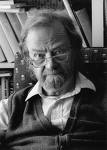
Poet Billy Collins said this about Hall: “Hall has long been placed in the Frostian tradition of the plainspoken rural poet. His reliance on simple, concrete diction and the no-nonsense sequence of the declarative sentence gives his poems steadiness and imbues them with a tone of sincere authority. It is a kind of simplicity that succeeds in engaging the reader in the first few lines.”
Last month, I reviewed Hall’s collection of essays about New England and New Hampshire, Eagle Pond.
For National Poetry Month, three poems by Donald Hall.
Christmas Party at the South Danbury Church
December twenty-first
we gather at the white Church festooned
red and green, the tree flashing
green-red lights beside the altar.
After the children of Sunday School
recite Scripture, sing songs,
and scrape out solos,
they retire to dress for the finale,
to perform the pageant
again: Mary and Joseph kneeling
cradleside, Three Kings,
shepherds and shepherdesses. Their garments
are bathrobes with mothholes,
cut down from the Church’s ancestors.
Standing short and long,
they stare in all directions for mothers,
sisters and brothers,
giggling and waving in recognition,
and at the South Danbury
Church, a moment before Santa
arrives with her ho-hos
and bags of popcorn, in the half-dark
of whole silence, God
enters the world as a newborn again.
Mount Kearsarge Shines
Mount Kearsarge shines with ice; from hemlock branches
snow slides onto snow; no stream, creek, or river
budges but remains still. Tonight
we carry armloads of logs
from woodshed to Glenwood and build up the fire
that keeps the coldest night outside our windows.
Sit by the woodstove, Camilla,
while I bring glasses of white,
and we’ll talk, passing the time, about weather
without pretending that we can alter it:
Storms stop when they stop, no sooner,
leaving the birches glossy
with ice and bent glittering to rimy ground.
We’ll avoid the programmed weatherman grinning
from the box, cheerful with tempest,
and take the day as it comes,
one day at a time, the way everyone says,
These hours are the best because we hold them close
in our uxorious nation.
Soon we’ll walk — when days turn fair
and frost stays off — over old roads, listening
for peepers as spring comes on, never to miss
the day’s offering of pleasure
for the government of two.
White Apples
when my father had been dead a week
I woke
with his voice in my ear
I sat up in bed
and held my breath
and stared at the pale closed door
white apples and the taste of stone
if he called again
I would put on my coat and galoshes
Postings and News Updates:
Will at Journey Round My Skull posted an article in May of 2009 about a long-forgotten book that includes a section on Poets Ranked by Beard Weight. Thank you, Maureen Doallas, for finding that bit of Edwardian esoterica.
And Maureen also found this: Annie Finch at Harriet, a blog at the Poetry Foundation, announced a new national holiday, Dead Poets Remembrance Day. It starts — today.
- Poets and Poems: Luci Shaw and “An Incremental Life” - April 3, 2025
- Ben Palpant Talks with 17 Poets About, Well, Poetry - April 1, 2025
- Poets and Poems: Forrest Gander and “Mojave Ghost” - March 27, 2025
Maureen Doallas says
Glynn, you’ve been reading the books on my shelf again. I have all of Hall’s work, prose and poetry, and that of his late wife, poet Jane Kenyon. “White Apples” is just one of Hall’s many poems that are terrific.